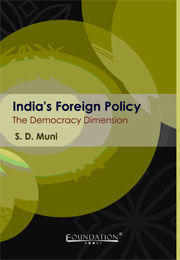Book contents
- Frontmatter
- Contents
- Preface
- 1 Introduction
- 2 The Nehruvian Phase: Ideology Adjusts with Realpolitik
- 3 Nehru's Successors: Realism Takes Command
- 4 Imperatives of the New Millennium
- 5 An Overview
- Appendix I Warsaw Declaration on Community of Democracies, June 2000
- Appendix II Santiago Commitment; Community of Democracies, April 2005
- Appendix III PM's Address to Joint Session of the US Congress, July 2005
- Appendix IV PM's Speech at the Foundation Stone Laying Ceremony of Afghan Parliament, August 2005
- Appendix V PM's Speech at the UN Democracy Fund, September 2005
- Appendix VI PM's Speech at the Conference on Democracy, Development and Social Inclusion, December 2005
- Index
Appendix IV - PM's Speech at the Foundation Stone Laying Ceremony of Afghan Parliament, August 2005
Published online by Cambridge University Press: 26 October 2011
- Frontmatter
- Contents
- Preface
- 1 Introduction
- 2 The Nehruvian Phase: Ideology Adjusts with Realpolitik
- 3 Nehru's Successors: Realism Takes Command
- 4 Imperatives of the New Millennium
- 5 An Overview
- Appendix I Warsaw Declaration on Community of Democracies, June 2000
- Appendix II Santiago Commitment; Community of Democracies, April 2005
- Appendix III PM's Address to Joint Session of the US Congress, July 2005
- Appendix IV PM's Speech at the Foundation Stone Laying Ceremony of Afghan Parliament, August 2005
- Appendix V PM's Speech at the UN Democracy Fund, September 2005
- Appendix VI PM's Speech at the Conference on Democracy, Development and Social Inclusion, December 2005
- Index
Summary
I feel greatly honoured and privileged to be present here today as we mark the opening of a new page in the history of this blessed country of Afghanistan. It is an honour that gives me particular satisfaction, as a friend of Afghanistan and a representative of the Indian people who constitute the world's largest democracy and the oldest in this region.
Today, as Baba e Millat lays the foundation stone of the Parliament of the Islamic Republic of Afghanistan, the roots of a plant are being laid that will, through your nurturing and care, grow into a sturdy ‘panja chinar’ of democracy.
Representation is the very essence of democracy. This edifice, when it is built, will be the very heart of democracy in Afghanistan. We believe that democratic institutions need to be encouraged, nursed and promoted. We also believe that they should develop and evolve in accordance with the culture, values and native genius of each country.
We are partnering other democracies through the Global Democracy Initiative and have contributed $10 million to the UN Democracy Fund to be used to promote institutions based on the eternal values of liberty, equality and fraternity.
Afghanistan may be a young democracy but it has always been a plural society, with a unique mosaic of different ethnic and linguistic groups. The Afghan people have a tradition of democratic discourse through institutions like the Loya Jirgas.
- Type
- Chapter
- Information
- India's Foreign PolicyThe Democracy Dimension, pp. 166 - 167Publisher: Foundation BooksPrint publication year: 2009



